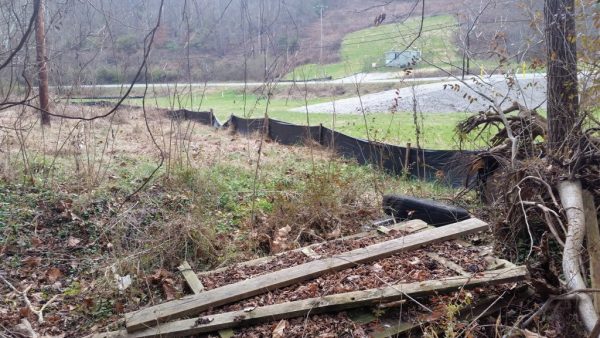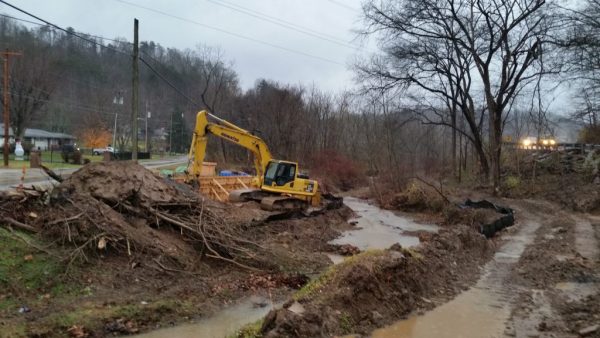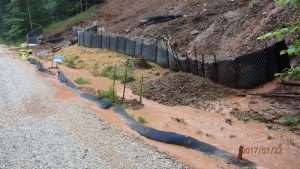Despite multiple citizen requests, we will not be granted a permit hearing in Cabell, Wayne or Putnam counties for the Mountaineer Xpress Pipeline’s stormwater permit.
The deadline for written comments on this permit is December 22, so you have a little more time to make your opinions known on the Mountaineer Xpress Pipeline project’s stormwater permit. Instructions for emailing or mailing comments can be found here.
Instructions on how to locate and download the stormwater permit documents can be found here.
To help start your thought processes on potential comments, see below excerpts from some comments made at the December 12 Ripley hearing for this permit:
From OVEC’s Robin Blakeman, who also spoke on behalf of WV Interfaith Power and Light:
The amount of acreage to be disturbed by this project gives me pause. From the final EIS narrative statistics, I calculated that a total of 2721.5 acres will be disturbed for the pipeline, 128.5 for above ground facilities, 301.9 for access roads, and 496 for staging areas and contractor yards. This is a total of 3,647.9 acres. With the massive disturbance of West Virginia soils underway for not only this pipeline but a multitude of others proliferating across the state, we would strongly encourage a cumulative impact study on the runoff contamination potentials of this project prior to its approval. When paired with the cumulative impact potential from many other projects, we believe the waterways of West Virginia are endangered. Water is our most precious resource in this state, and the absolute best practices and regulatory enforcement levels are necessary to protect it at this point in time.
Therefore, we want to make sure the following points are addressed prior to approval of this project:
- Due to the steep terrain this project is proposed to traverse, traditional means of erosion control—such as silt fences and “socks”—have largely proven inadequate on multiple other projects. I would request that more effective alternatives be mandated to control erosion, no matter how costly to the project. Picture below are of recent silt fence failures in Cabell County, near SM-80 pipeline construction sites:


- I request baseline water testing—in all streams that this project is proposed to traverse—be implemented prior to initial construction on the project, and that periodic (at least monthly) water tests be implemented at those sites during the duration of the construction and initial start-up phases of the project. I request that this be done at cost to the construction and/or pipeline operating corporation(s), and that water quality analytical means include testing for heavy metals such as lead, arsenic and selenium. I request that the test results be made available to the public in a timely manner—within two weeks of official receipt of the test result data.
- I request that there be at least monthly site visits from the DEP on all active construction locations for this project, and that members of the public/citizens of WV may be allowed to accompany DEP officials on these visits, upon request.
- I am aware that there are endangered mussel species in some streams that this project is proposed to traverse. Therefore, I would request that there be a full analysis of species to be impacted in all streams, and ongoing monitoring.
From Cindy Ellis, with WV Highlands Conservancy—one of OVEC’s prime allies in MXP opposition and stream testing programs:
- Rip Rap. I’m told that DEP does not look favorably on the use of rip rap for post-construction stream edges. I join any others who are requesting that DEP should insist upon natural stream design rather than rip rap.
-
The MXP will cause us to lose ecosystem services. Let us look at safety, and particularly post-construction impacts. We who have looked at the record of Columbia gas see worrisome figures.
Here are leaks and ruptures in natural gas lines for the years 2010 through 2017 in West Virginia at Columbia lines and compressor stations.
- Flattop, compressor station 8/12/17 total costs $20,619
- Lanham, compressor station 1/3/2014 total costs $65,218
- SM-80 rupture due to corrosion,12/11/2012 ignited, total costs $4,276,318
- Smithfield compressor station 8/25/ 2016 total costs $49, 816
- Adaline compressor station 1/21/2012 total costs $9,877
- Lost River compressor station 3/25/2015 total costs $15, 359
- Line 8223 9/16/2015 total costs $3, 273
- Line 8012 12/15/2011 total costs $58, 331
- Smithfield pipeline 7/9/2014 total costs $47, 422
-
In addition to clean-up costs totaling $5,498,213, these have resulted in large methane emissions which contribute to climate extremes, including floods. See source.
-
On July 7, 2015, a Columbia pipeline construction accident fouled the public water system at Peterstown, WV. Service to the community was disrupted for 2 ½ weeks.
-
We do realize that Columbia was purchased last year by TransCanada. That company’s record is also problematical.
-
As a birder in West Virginia for 35 years, I must take every opportunity to speak up for the birds. Birds play a vital role in the health of our world, as controllers of insect populations
 and as pollinators and dispersers of seeds. Birders value all species, but they rate scant mention in the final EIS (environmental impact statement) for the MXP. It does acknowledge the harm that will come to Cerulean Warblers in the Lewis Wetzel Wildlife Management Area, but fails to note how construction practices and stream alteration will impact others. Many of the waterways to be affected by the MXP are an important part of the habitat for our state’s breeding and resident bird species. Stormwater events and construction mistakes may damage a wide circle of creatures and their habitat. It is regrettable that state and federal regulations only focus upon birds with declining populations or only use the Endangered Species Act or Migratory Bird Treaty Act as tools. A better approach would be to help all of us be aware of the interconnections and multiple factors that guarantee the survival of birds…and of ourselves.
and as pollinators and dispersers of seeds. Birders value all species, but they rate scant mention in the final EIS (environmental impact statement) for the MXP. It does acknowledge the harm that will come to Cerulean Warblers in the Lewis Wetzel Wildlife Management Area, but fails to note how construction practices and stream alteration will impact others. Many of the waterways to be affected by the MXP are an important part of the habitat for our state’s breeding and resident bird species. Stormwater events and construction mistakes may damage a wide circle of creatures and their habitat. It is regrettable that state and federal regulations only focus upon birds with declining populations or only use the Endangered Species Act or Migratory Bird Treaty Act as tools. A better approach would be to help all of us be aware of the interconnections and multiple factors that guarantee the survival of birds…and of ourselves.
Additional sample comments and instructions on submission of written comments are available from our friends at WV Rivers Coalition. Read WV Rivers Coalition fact sheet on the MXP’s stormwater permit and submit your MXP comments to WVDEP by Friday, December 22, 2017. Thanks WV Rivers!
And more comments can be found in an earlier Hoots and Hollers blog post, here.











Stop all pipelines.